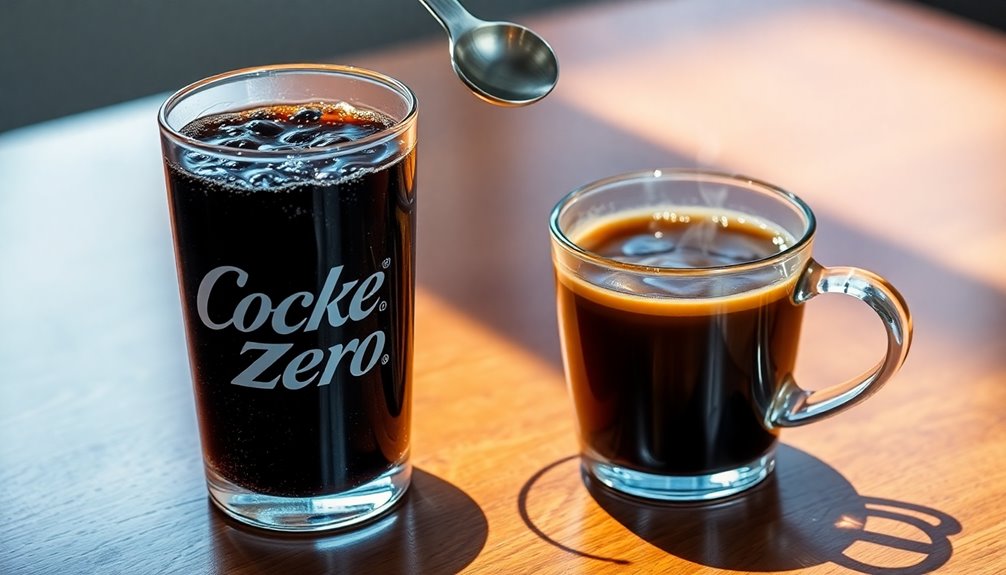Coke Zero contains 34 mg of caffeine per 12 oz can, which is much lower than what you'll find in a typical cup of coffee, usually around 140 mg. So, if you're monitoring your caffeine intake, Coke Zero can be a suitable option. For comparison, regular coffee's caffeine content can range from 60 to 200 mg depending on the brew method. While Coke Zero offers a refreshing taste without the calories, it won't give you the same caffeine boost as coffee. Stick around, and you'll uncover more interesting details about caffeine levels in different drinks and their effects on your health.
Key Takeaways
- Coke Zero contains 34 mg of caffeine per 12 oz can, which is lower than a typical cup of coffee.
- A regular cup of coffee contains 140 mg of caffeine per 8 oz, significantly more than Coke Zero.
- Diet Coke has a higher caffeine content at 46 mg per can compared to Coke Zero.
- Caffeine content in Coke Zero is the same as Regular Coke, but Coke Zero has zero calories.
- Overall, Coke Zero has much less caffeine than various coffee types, including drip and cold brew.
Caffeine Content in Coke Zero
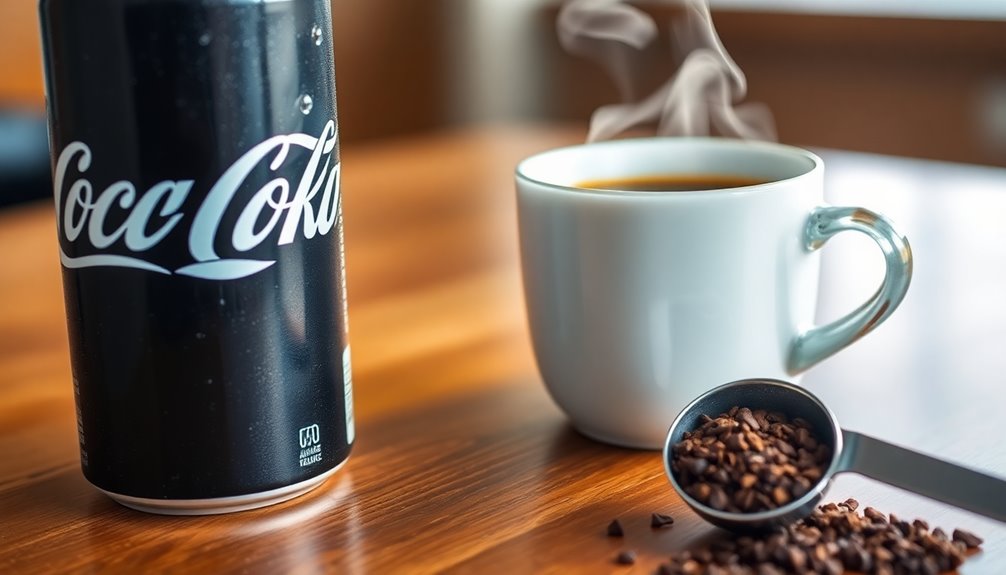
Caffeine is a key ingredient in Coke Zero, providing a boost without the added sugar. Each 12-ounce can contains 34 mg of caffeine, which is considered safe for adults. This amount is lower than many other caffeinated drinks, especially when you compare it to a typical cup of coffee, which has around 140 mg. If you're a Diet Coke fan, you'll notice that it has even more caffeine at 46 mg per can. Additionally, Coke Zero is marketed as a healthier alternative to sugary sodas, appealing to health-conscious consumers. Coke Zero offers more caffeine than some decaf coffees but less than energy drinks like Red Bull. For those looking to avoid caffeine, Coke Zero does have caffeine-free options available.
Enjoy it in various flavors like Cherry or Vanilla, all while keeping your calorie count at zero!
Comparing Coke Zero and Regular Coke
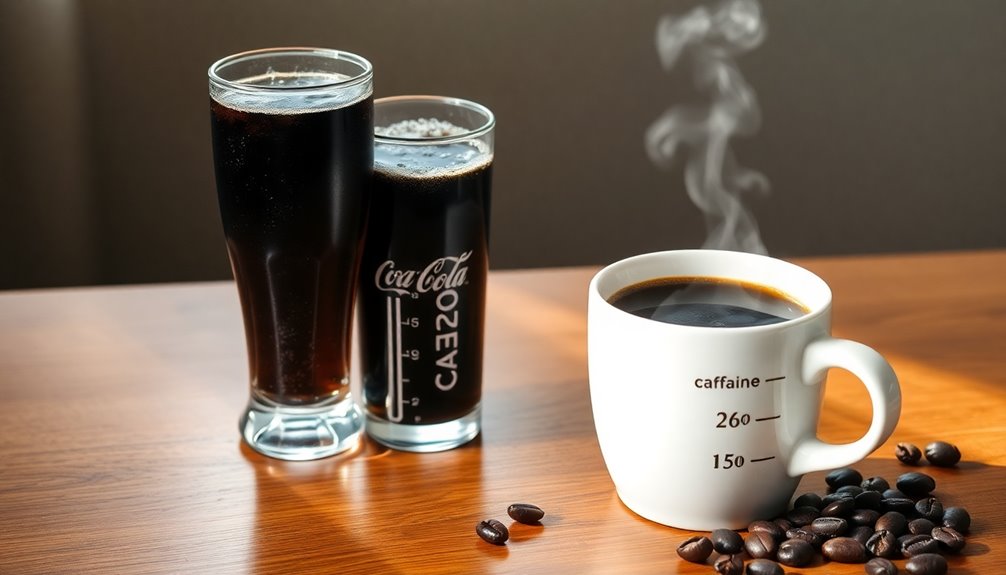
When you compare Coke Zero and Regular Coke, you'll find distinct differences that cater to various preferences and health considerations.
Coke Zero contains no calories, fat, carbohydrates, or added sugars, making it a calorie-free alternative. In contrast, Regular Coke packs about 140 calories and 39 grams of sugar per 12 oz can, which can lead to health issues if consumed in excess. Interestingly, both drinks share the same caffeine content of 34 mg caffeine per 12 oz can.
Flavor-wise, Coke Zero aims for a taste similar to Regular Coke but falls between it and Diet Coke, offering additional flavors like Cherry and Vanilla.
While neither is deemed a healthy choice, Coke Zero is often seen as the better option due to its lack of sugar.
Caffeine Levels in Different Coffees
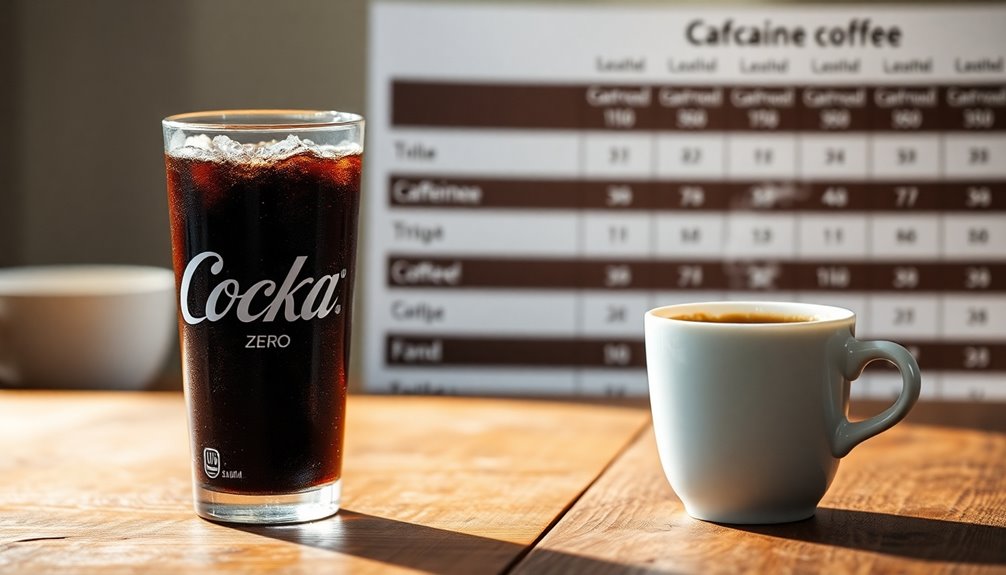
Coffee offers various caffeine levels that can significantly impact your daily intake.
For instance, an 8 oz cup of drip coffee generally contains 60-180 mg of caffeine, with lighter roasts packing more punch than darker ones. This is due to the fact that lighter roasts are roasted for a shorter amount of time, allowing them to retain more of the caffeine content from the beans. If you’re trying to monitor your caffeine intake, it’s important to consider how much caffeine in coffee you’re consuming, especially if you prefer a stronger brew. Additionally, factors such as grind size and brewing method can also impact the caffeine content in your cup of coffee. Another factor to consider is the type of coffee bean used; Arabica beans generally have less caffeine than robusta beans. Therefore, if you’re looking to increase the caffeine content in coffee, opting for robusta could be a better choice. Ultimately, understanding the various elements that influence caffeine levels can help you make informed decisions about your coffee preferences and manage your overall caffeine intake effectively.
If you opt for espresso, you'll get about 60-75 mg per 1 oz shot, but remember that the serving size is smaller.
French press coffee usually delivers 100-140 mg per 8 oz due to longer brewing times.
Meanwhile, cold brew coffee is the heavyweight, boasting 150-200 mg per 8 oz. This variance in caffeine content makes coffee a much higher caffeine source than soft drinks like Coke.
Each type of coffee not only varies in caffeine content but also in flavor, making your choice crucial for both your energy levels and taste preferences.
Health Implications of Caffeine

Although many people enjoy the boost caffeine provides, it's important to be aware of its health implications.
Coke Zero contains 34 mg of caffeine per 12-ounce can, a relatively low amount compared to other caffeinated beverages. While this fits within the FDA's daily limit of 400 mg for most adults, excessive caffeine can lead to increased heart rate, anxiety, and sleep disruptions. Caffeine's half-life varies from 1.5 to 9.5 hours, which means its effects can linger longer in some individuals.
If you're pregnant, it's wise to limit your intake to 200 mg daily. Remember, individual tolerance varies, so what works for one person may not work for another.
Always consult a healthcare provider if you have specific health conditions or concerns about caffeine, especially if you're taking medications or are pregnant.
Ingredients in Coke Zero

Coke Zero's unique blend of ingredients creates its signature taste without the calories. It primarily consists of water, caramel color, phosphoric acid, and natural flavors. The sweetness comes from aspartame and acesulfame K, ensuring you enjoy a flavorful drink without added sugar. You won't find any fat, carbohydrates, or protein here, making it a calorie-free choice. Caffeine is included, providing 34 mg per 12 oz can, which is similar to regular Coke but less than a standard cup of coffee. This is significant because the average caffeine in an 8-ounce cup of coffee is 95 milligrams—much higher than Coke Zero. Essential oils can be a great alternative for a caffeine boost if you're looking for natural options.
The drink also contains sodium citrate as an acidity regulator and a source of phenylalanine. With only 1.4 kJ per 100 ml, Coke Zero is a refreshing option that keeps your calorie count in check.
Flavor Variations of Coke Zero
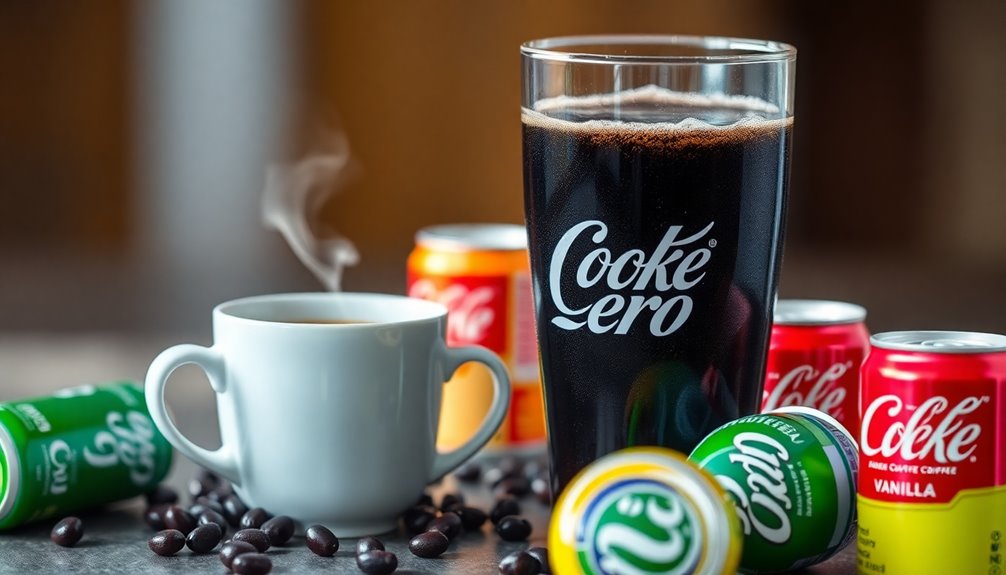
What flavors of Coke Zero can you enjoy? You've got a variety to choose from!
There's the classic Coke Zero Cherry, refreshing Coke Zero Lime, and smooth Coke Zero Vanilla. If you're looking for something a bit different, try Coke Zero Cherry Vanilla or the delightful Coke Zero Orange Vanilla. Each of these flavors maintains the same caffeine level—34 mg per 12 oz can—so you won't have to worry about varying caffeine content. They're specifically designed to taste like regular Coke, giving you that familiar flavor experience. In fact, Coke Zero contains approximately 34 mg of caffeine per 12 oz serving, which is similar to regular Coke. If you want to avoid caffeine altogether, there's a caffeine-free option available too, containing zero caffeine. Enjoy exploring these delicious variations!
Caffeine Awareness for Consumers
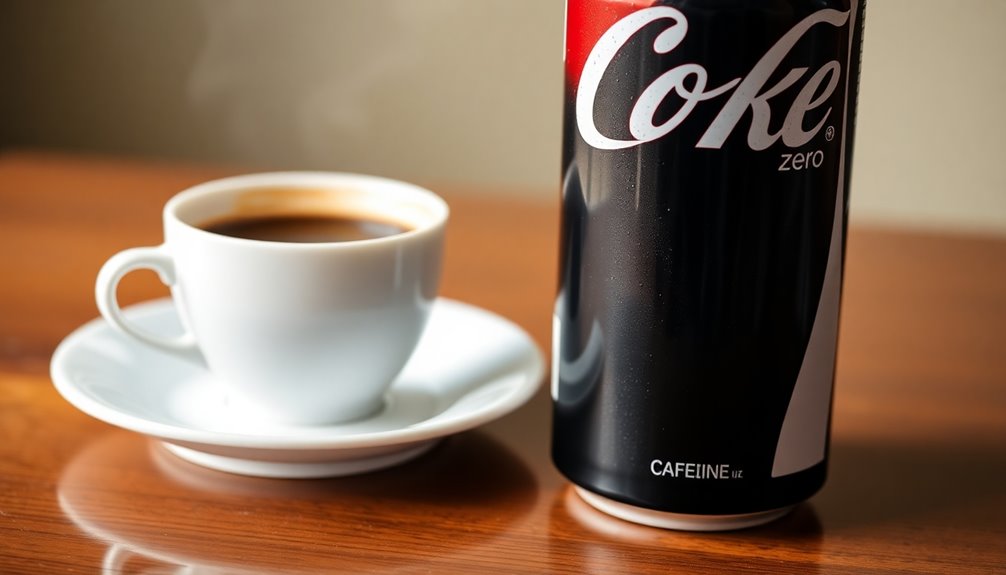
As you explore the flavorful options of Coke Zero, it's important to stay informed about caffeine consumption. Each 12 oz can contains 34 mg of caffeine, the same as regular Coke, but less than Diet Coke's 46 mg. While this amount is considered safe for adults, it's still lower than the 95 mg found in a typical cup of brewed coffee. With 88% of Americans consuming caffeine, and many doing so multiple times a day, understanding what you're drinking is crucial. Many consumers are unaware of caffeine levels in everyday beverages. Additionally, 83.2% of adolescents regularly consume caffeinated beverages, highlighting the widespread nature of caffeine consumption among different age groups.
Moderation and Caffeine Intake
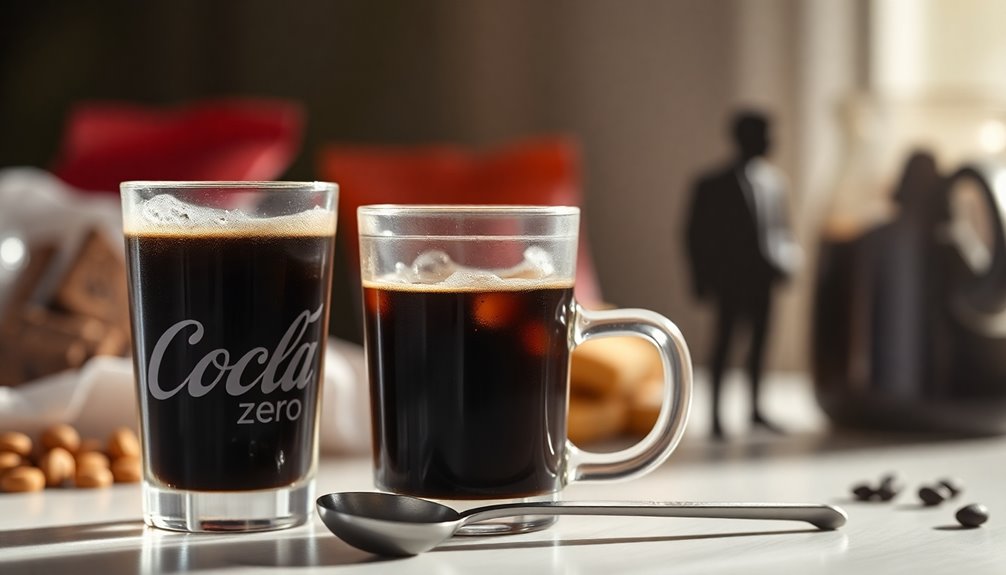
While enjoying Coke Zero, it's crucial to be mindful of your caffeine intake. Each 12 oz can contains 34 mg of caffeine, significantly less than the 95 mg found in a cup of brewed coffee. In fact, Coke Zero Sugar has lower caffeine levels compared to many energy drinks, making it a more moderate choice for those watching their intake. To stay within safe daily limits, try to limit yourself to 1-2 cans a day, totaling no more than 24 oz. The FDA recommends a maximum of 400 mg of caffeine daily for most adults, but be cautious if you're pregnant, breastfeeding, or have certain health conditions.
Children under 12 should avoid caffeine, and adolescents should cap their intake at 100 mg. Always track your total caffeine consumption to ensure you're not exceeding these recommended limits.
Alternatives to Caffeinated Beverages
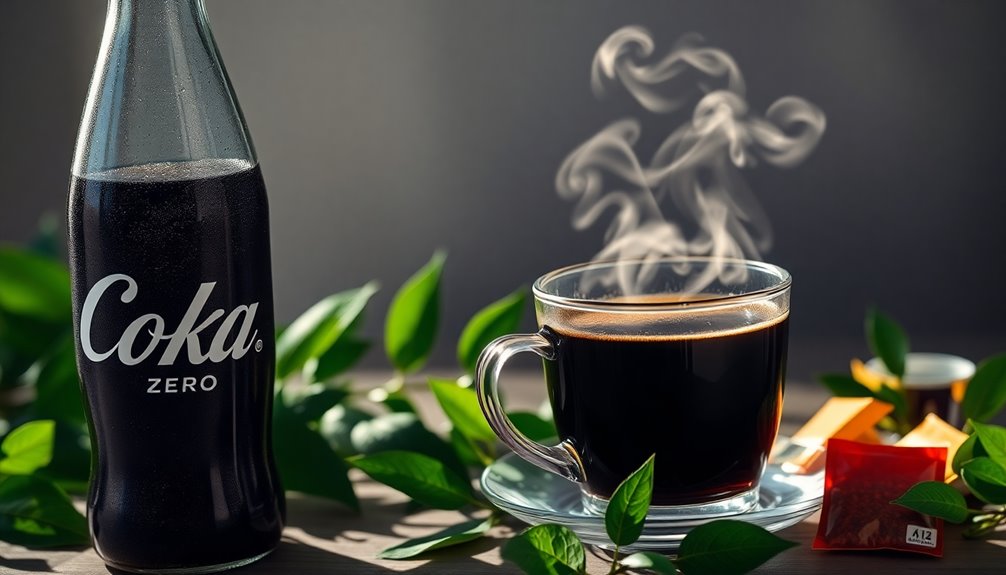
If you're looking to cut back on caffeine but still want something refreshing, there are plenty of alternatives to consider. Non-caffeinated soft drinks like seltzer water, fruit-flavored sparkling water, and herbal teas can quench your thirst without the jitters. Brands such as LaCroix and Spindrift offer delightful, caffeine-free options. You can also infuse your water with fruits and herbs for extra flavor. Herbal teas like peppermint and chamomile are naturally caffeine-free, while decaffeinated teas give you the taste of tea without the buzz. Interestingly, many herbal teas provide a relaxing effect without the caffeine associated with coffee, and certain scents like lavender can enhance this calming experience. Don't forget about milk and fresh juices, which are both delicious and caffeine-free. Lastly, plain water or flavored seltzer adds variety while keeping caffeine at bay.
Frequently Asked Questions
Can Children Consume Coke Zero Safely?
You should be cautious when allowing children to consume Coke Zero.
While it has less caffeine than coffee, it can still negatively impact their sleep, increase anxiety, and exacerbate depressive symptoms.
Moderation is key, and opting for caffeine-free alternatives like juice or water is wise.
Always monitor their overall health and behavior related to caffeine intake.
If you have concerns, consulting a healthcare professional can provide helpful guidance tailored to your child's needs.
How Does Caffeine Affect Sleep Quality?
Caffeine can significantly impact your sleep quality. If you consume it, you might notice reduced total sleep time and efficiency, along with longer time to fall asleep.
You may also wake more frequently during the night. Deep sleep duration decreases while light sleep increases, making your rest less restorative.
To maintain good sleep quality, it's best to limit caffeine intake, especially in the hours leading up to bedtime.
What Are Signs of Caffeine Sensitivity?
If you're sensitive to caffeine, you might notice several signs.
Physical symptoms can include an increased heart rate, jitters, and insomnia. You may also feel anxious or irritable, struggle to concentrate, or experience headaches.
Additionally, you might become easily restless or dizzy. In severe cases, symptoms can escalate to palpitations or panic attacks.
If you recognize these signs, it's wise to reconsider your caffeine intake and consult a healthcare professional if needed.
Are There Long-Term Effects of Caffeine Consumption?
Caffeine consumption can lead to several long-term effects you should be aware of.
You might experience increased heart rate and sleep disturbances, affecting your overall health and sleep quality.
It can also lead to nutritional deficiencies and impact your mental health, potentially causing anxiety or mood swings.
Over time, you could develop a dependence on caffeine, facing withdrawal symptoms like headaches and fatigue if you try to cut back.
Moderation is key!
Can Coke Zero Help With Weight Loss?
Coke Zero won't help you lose weight on its own. While it has zero calories and no sugar, it lacks nutritional value and can lead to cravings for sweet tastes.
It might fit into a calorie-controlled diet, but relying on it can result in unhealthy habits. Instead, focus on drinking water or other nutritious beverages.
Moderation is key; don't let Coke Zero replace healthier options in your daily routine.
Conclusion
In conclusion, while Coke Zero contains caffeine, it's generally less than a standard cup of coffee. If you're looking for a refreshing drink with a bit of a kick, Coke Zero could be a great option. Just remember to be mindful of your overall caffeine intake, especially if you enjoy coffee as well. With plenty of alternatives available, you can always find the right beverage to suit your taste and caffeine preferences. Stay informed and drink responsibly!
